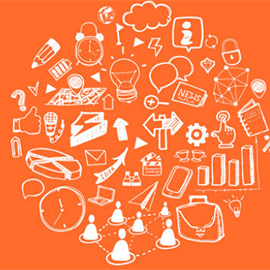Days ago, StartupAUS’s Crossroads report detailed chinks in Australia’s start-up ecosystem, calling for a major overhaul if the nation is to catch up with global leaders. Now, Microsoft is calling for a review of the country’s “industrial-age innovation ecosystem.”
The software mogul has released a new discussion paper, called ‘Joined-Up Innovation’, that details a new approach to improve “connections within our innovation ecosystem locally and globally.”
“Australia has amazing strengths,” said Pip Marlow, Microsoft Australia Managing Director. “…But if we want to maintain – and preferably improve – our competitive position, we need to reinvent our innovation ecosystem for the information age rather than sticking with models developed in the industrial age.”
The paper titled, “Joined-Up Innovation: Making the right connections across Australia’s innovation ecosystem to support our future growth and international competitiveness,” is based on a roundtable discussion by a group of innovation experts, along with interviews of several others.
The Joined-Up Innovation vision is focused sharply on the small and medium-enterprise (SME) sector, seen as pivotal to the Australian economy.
“SMEs are often overlooked as a source of innovation in this country,” Marlow said. “However, they develop more than one third of Australia’s gross domestic product and account for more than half of private sector employment. Previous research has shown these businesses are less risk-averse than large companies, giving them a greater willingness and cultural capacity to innovate.”
The discussion paper cites new data from PricewaterhouseCoopers to bolster its call for a revamp of the innovation ecosystem, saying such a move can transform Australia’s SME laggards to leaders in their use of technology. A revived innovation system – technology adoption, accompanied by business process changed – could have increased GDP by nearly $6 billion (or 0.4%) in 2012-2013, raised real wages by 0.5% and added $11 billion to the economy, according to PwC.
Participating experts include industry veterans from companies such as Intel and Microsoft and academicians from the University of Melbourne and the Australian Academy of Technological Sciences and Engineering came up with the following suggestions:
- improve relationships between individuals and organisations
- reinvent the way we work, moving from slow, linear innovation processes to more collaborative models
- transform the risk-averse culture
- improve knowledge and information sharing
- cultivate a wide range of skills
- make it easier for talented individuals to move around within our innovation ecosystem
“I’ve long believed that not only the world’s future, but Australia’s future, lies in developing knowledge-based industries and services,” said Prof. Roy Green, Dean of UTS Business School, who participated in the roundtable.
Here is a list of the roundtable participants and interviewees included:
- Dr Genevieve Bell, Director of Interaction and Experience Research, Intel
- Suzanne Campbell, CEO, Australian Information Industry Association
- Prof. Roy Green, Dean of UTS Business School
- Dr Kate Cornick, Director, Industry Engagement and Innovation, The University of Melbourne
- Dr. Alan Finkel, President of the Australian Academy of Technological Sciences and Engineering.
- Peter Freedman, CEO, RØDE Microphones
- Hamish Hawthorn, CEO, ATP Innovations
- Murray Hunter, Founder & CEO, Design + Industry
- Pip Marlow, Managing Director, Microsoft Australia
- Adam McArthur, CEO & Co-founder, ParcelPoint
- Dr. Bill Petreski, Director, Hydrix
- Sandy Plunkett, Innovation and Investment Consultant (facilitator)
- Graeme Strange, Managing Director, Readify
- Dr. Frank Vetere, Associate Professor, The University of Melbourne
- Dr. Hon Weng Chong, Founder, StethoCloud






![Inbound Marketing Reloaded with James Tuckerman [FREE REPORT]](https://anthillonline.com/wp-content/uploads/2015/07/cover-3d-347h-x-253w--253x194.png)
![Five ways to manage your time by managing yourself, with Helen Ebdon [CHEAT SHEET]](https://anthillonline.com/wp-content/uploads/2015/07/ebdon-3d-cover-01--100x75.png)
![Need more leads? Here are five strategies [FREE DOWNLOAD]](https://anthillonline.com/wp-content/uploads/2016/04/james-FIVE-SIMPLE-STRATEGIES-TO-GET-MORE-LEADS-01-06.pdf-Box-2016-05-13-15-49-32-100x75.png)
![How to zig when everyone else is zagging, with Julio De Laffitte [CHEAT SHEET]](https://anthillonline.com/wp-content/uploads/2015/08/Capture2-100x75.jpg)
![How Master the Art of Sales Even if it Makes You Feel All Weird and Icky Inside with Phil Anderson [CHEAT SHEET]](https://anthillonline.com/wp-content/uploads/2015/08/PHIL-ANDERSON-COVER-100x75.png)
![How to confidently raise venture capital… with Jack Delosa [CHEAT SHEET]](https://anthillonline.com/wp-content/uploads/2016/04/jack-de-losa-confidently-raising-venture-NFSU-rebrand-01.pdf-Box-2016-04-19-12-37-42-100x75.png)
![The best three minute video about managing employees and customers that you will ever see [VIDEO]](https://anthillonline.com/wp-content/uploads/2012/11/capuchinMonkeys.jpg)

![Why hockey stick growth isn’t always a good thing [VIDEO]](https://anthillonline.com/wp-content/uploads/2014/07/HockeyStickChart-300x329.jpg)
![What’s storytelling got to do with your brand [VIDEO]](https://anthillonline.com/wp-content/uploads/2014/02/darrynatclass.jpg)
![5 Ways to get more out of your coffee shop meetings with Antony Gaddie [CHEAT SHEET]](https://anthillonline.com/wp-content/uploads/2015/07/gaddie-3d-cover-01--300x194.png)
![How to market your business when you don’t have a business yet [CHEAT SHEET]](https://anthillonline.com/wp-content/uploads/2016/01/oli-gardner-memes-02-100x75.jpg)
![The Gaddie Pitch in three simple sentences with Antony Gaddie and James Tuckerman [CHEAT SHEET]](https://anthillonline.com/wp-content/uploads/2015/08/GADDIE-PITCH-updated-3D-cover--100x75.png)
![The Facebook Honey Trap with James Tuckerman [CHEAT SHEET]](https://anthillonline.com/wp-content/uploads/2015/11/Screen-Shot-2015-11-26-at-11.34.14-100x75.png)
![Learn how to generate more leads in one month than most competitors would in one year! [FREE REPORT]](https://anthillonline.com/wp-content/uploads/2015/08/Capture4-100x75.jpg)
![New Zealand’s Xero eyes US IPO, further disruption as subscribers increase [INFOGRAPHIC]](https://anthillonline.com/wp-content/uploads/2014/07/sruuuuujana-212x194.png)
![Ever wonder if your ‘content marketing’ is really just crap? You gotta see this! [INFOGRAPHIC]](https://anthillonline.com/wp-content/uploads/2014/08/content-100x75.jpg)
![7 Business Lessons From Game of Thrones [INFOGRAPHIC]](https://anthillonline.com/wp-content/uploads/2014/10/infographic-games-of-thrones-041-100x75.jpg)
![How to build your own Media Empire… In seven steps with Nathan Chan [INFOGRAPHIC]](https://anthillonline.com/wp-content/uploads/2014/10/Nathan-Chan-Infographic-e1413419529176-100x75.jpg)
![5 Business Lessons From Tinder [INFOGRAPHIC]](https://anthillonline.com/wp-content/uploads/2014/10/Tinder-Elegant-Infographic-100x75.jpg)



